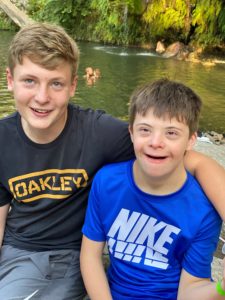Families: Coping with the pandemic when you have schoolkids with disabilities
Escrito por Maggie Suter
On Viernes, Marzo 13, 2020, the Harikrishnan boys arrived home from school on the bus as usual, excited that spring break was officially here. This meant nine days in a row with no school!
What no one in the Harikrishnan household knew at the time was that those nine days would actually turn into 77 days, the remainder of the semester. Students in Texas and around the country were told to stay home in order to avoid the risk of catching and spreading COVID-19.
Fast forward to Agosto 2020. Backpacks and school supplies line the aisles of stores in anticipation of the new 2020-21 school year, even though no one is sure what it will look like. And for Priya Harikrishnan, the mother of two sons with autism spectrum disorder, the unknown is especially troublesome.
Lesson 1: Address your stress, even when spare time is the last thing you have.
“When the schools closed last spring, the biggest challenge for our family was figuring out how to support both of our boys,” Priya said. “Our oldest was a freshman in high school and the youngest was in sixth grade with a one-to-one aide for most of the day.”
Both Priya and her husband work full time, manage household responsibilities, parent two children with disabilities – and suddenly needed to provide intensive support for remote learning. “I felt like I couldn’t do it all,” she said. “It was impossible.”
Priya began to notice how anxious she was feeling. After the stress began to affect her health and mood, she knew she had to do something. She began a daily routine of yoga and meditation. She immediately recognized the peace it gave her, and she has stuck with it. “Not only do I enjoy taking some time for myself, but the time gives me a balance for my day and I feel better able to handle the daily challenges,” said Priya.
Apps and YouTube channels offer free meditations and yoga for all levels of experience. Priya suggests Techniques from Art of Living, the YouTube channel she follows daily. Other popular meditation apps with some free options are Calm, Headspace, Smiling Mind (for kids), and Aura. Research shows that even just a five-minute meditation is enough to ease anxiety and improve mood and focus.
Lesson 2: Tackle loneliness and isolation for social kids
Suzanne Wilson, a mother of three whose fifth grade son Jack has Down syndrome, said that he has enjoyed staying home all the time once school was out.

Jack and big brother Peter.
“Xbox and YouTube plus available snacks seemed like a win,” Suzanne said. “Plus, remote learning is hard. I had to sit next to him or be within arm’s length to make sure he was engaged and on target.”
Offering one-on-one support for one child when there are other children in the house who also need help – and working full time – is just not realistic.
During the pandemic, Jack has had particular trouble adjusting to the sudden lack of social time and interactions with friends and teachers. Since he enjoys playing chess, Suzanne found a way for Jack to play online against some of his buddies from school and stream the games on Zoom.
“This allowed for some of the good old trash talking that fifth grade boys have,” she said. Zoom playdates like this have become popular. One class of middle school students at West Ridge Middle School west of Austin held regular dance parties over Zoom in the spring. Their teacher, Nicki Smith, sent out an invite for everyone to login and join the party. Some students dressed up, and other teachers, staff members, and even pets joined. The students were thrilled to see their friends. These types of distance interactions have eased some of the social isolation for children.
Lesson 3: Get technology support
Not everyone is comfortable with the technology that we have all suddenly been forced to learn. It can be a barrier for both students and their families. Keeping passwords, QR codes, logins, and usernames for different software applications can be challenging for anyone, especially students with disabilities and for families with multiple children.
Eanes ISD special education teacher Nicki Smith found that creating a master spreadsheet listing each child, their usernames, and passcodes was a must. She also created individual spreadsheets for each student and sent them to parents to keep handy so they wouldn’t have to sift through dozens of emails to find login information.
Smith recommends that students with personal devices store passwords on free applications like LastPass. “It will also autofill saved passwords,” she said, “making it much easier for students to function more independently.”
Most school districts are now offering technology workshops and training to help support families through remote learning.
For some families, lacking access to technology devices or wifi is the barrier itself, and schools are addressing this issue. Families needing support should contact their child’s school directly. An email or phone call to the school principal is usually enough to get the ball rolling.
What’s in the future?
Priya worries about the return of school this fall.
“How will I be able to keep my job while being a full time special education aide for my children and do the million other things I need to do and keep sane?” Priya said. Making time for herself and practicing meditation and yoga will be more important than ever for her.
This fall is full of uncertainty for families with school-aged children. Guidelines and recommendations from various agencies seem to be changing daily, making it difficult to plan their time and their lives. Those of us who are parents with children with disabilities experience another set of unique challenges. But we are not alone, and often it is other parents in the disability community who offer the best support and resources.
Finding support from other parents during the pandemic
Parents of children with disabilities often find each other through early childhood programs, preschool, or school. While in-person schooling is uncertain, parents of children with disabilities can also find support through this resource:
- Parent to Parent programs offer parent to parent support for families with children who have a health care need, disability, or mental health concern.
- Center for Parent Information and Resources provides information that links to state and local chapters of agencies focused on particular disabilities.
- Navigate Life Texas includes information on connecting with other parents of children with disabilities.
- Facebook disability groups for parents
Written by Maggie Suter, SAFE Disability Services Educator/Trainer
SAFE Educator and Trainer Maggie Suter is a Central Texas mother of four boys, two with disabilities. For this story, she asked other parents of children with disabilities to share their coping strategies and tools for getting through the pandemic, remote learning, social isolation, and working from home.